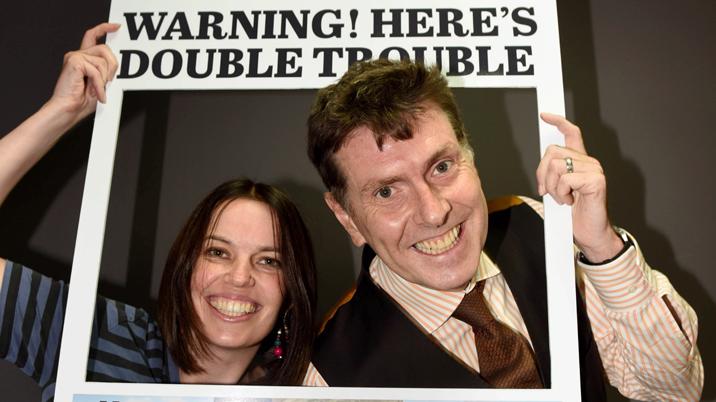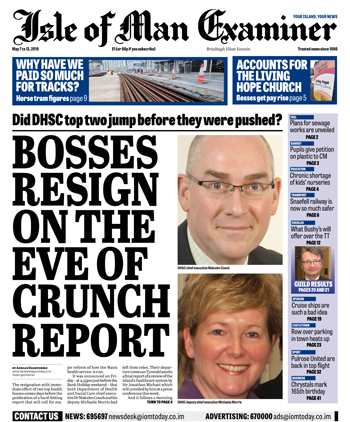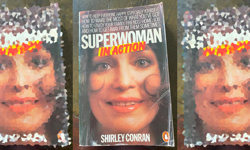
“I hope you don't mind the photo I sent,” says Richard Butt, editor at Isle of Man Newspapers, referring to himself and deputy editor Jacqueline Darbyshire. They’re both poking their faces with gleaming smiles through the portable newspaper you can see on these pages. “It’s just a bit of fun from when we were promoting the paper at an agricultural show and were getting kids to put their faces through the hole in the middle to get their pictures in print.”
It’s typical of Butt, who I first got to know nearly 30 years ago when we were both studying for NCTJ diplomas in journalism at what was then Lancashire Polytechnic in Preston. I’d asked him to send me his picture for this feature, but he never was one for a formal shot of men in suits. I can visualise his cheeky grin and feel his perennially impish sense of humour as he selected this photo instead. He was always seeking to make people laugh, never grabbing all the limelight for himself.
It’s this bright, inclusive approach to life that’s proved crucial in raising and maintaining spirits at the papers Butt’s edited since 2008. They are three weekly titles – the Isle of Man Examiner, Manx Independent and Isle of Man Courier – plus the iomtoday.co.im website. And like any regional media, they’ve faced hard times.
“The Examiner was selling around 12,000 when I joined as editor, and the Independent around 11,000,” the 52-year-old recalls. “Now the Examiner is 7,000 and the Independent is 6,800 – but that’s after eleven years. We're running about 3% down year-on-year for both paid-for titles, which is way below the industry average.
“In the last year alone, we’ve had 35 papers with year-on-year sales increases, and I know, from talking to friends across the industry, how unusual that is. The Courier is a free paper, delivered through 38,500 letterboxes, and unlike many free papers, it’s not an add-on. It’s vital to our company and has the bulk of our advertising, so its content is unique.
To succeed, we have to look forward rather than backwards and always improve.
Impressive reach
“Meanwhile, if we include the internet, our readership figures have never been so high, with between 50,000 and 60,000 unique users and 250,000 page impressions a week on iomtoday.co.im, leaping during TT [motorcycle races] week – with last week’s page impressions 324,461.”
To put all that into context, the population of the Isle of Man is just 85,000 – and so the above sales and digital figures add up to an impressive reach that would be the envy of many a mainland title.
“A big part of it is having a happy team here on the papers,” insists Butt, who says the morale and working environment is better now than at any time during his editorship. This is some claim given editorial staffing since 2008 has dropped from 28 to just 12, plus a bunch of freelancers.

“Yes, I had to radically change the way we work,” he admits. “This was difficult of course, but it taught me a lot. One of the hardest things was the closure of the [printing] press here, as I really didn’t want to see that. But its quality was not great and the cost of replacing it was prohibitive. We’ve been printing in the UK since. It’s been hard work and we’ve faced challenging times. But to succeed, we have to look forward rather than backwards and always improve.”
This positivity is helped by the fact that Butt survived many potential culls and changes that could have resulted from when Isle of Man Newspapers was owned by what was then Johnston Press, now JPI Media.
“There were lots of great people at Johnston and I enjoyed working with many of them,” he says carefully. “Unfortunately, it was an organisation that lurched around with seemingly endless reorganisations and changes in strategy.
“Like all media, of course, we suffered from the structural changes brought about by the internet. But Johnston’s previous management decisions to expand in the 2000s, with the purchase of The Scotsman, The Yorkshire Post and various Irish titles at the top of the market made things much worse as it had a huge debt burden.
“Fortunately, the Irish Sea and the fact that Isle of Man Newspapers is, and always has been, a separate company – albeit then ultimately owned by Johnston – with its own island-based board, helped to isolate us from the worst of it. Decisions about Isle of Man Newspapers have to be made by Isle of Man Newspapers’ board [which Butt sits on] here on the Isle of Man.
“I was not a fan of the common layouts and templates that Johnston introduced. They have a role, but they didn’t save much time and constrained us, especially making last-minute changes. They also depended on having staff in the office ‘writing to shape’, which is difficult when you use freelancers.”
Butt’s far happier now that his homeland media company is owned by Tindle Newspapers, which bought it from Johnston in 2016. He describes Tindle as “a good, old-fashioned – in a good way – newspaper company that cares for and understands the communities it serves”.
As a self-governing jurisdiction, the politics we cover is not just about lampposts and dog poo.
Increased pagination
This means he’s enjoyed expansion after enduring cuts, with the minimum pagination for the Manx Independent rising from 48 pages to 64 which, he’s sure, has made it a more attractive purchase. And as always, Butt is the living embodiment of poet John Donne’s words ‘no man is an island’, with most of his praise reserved for the people around him.
“I have a wonderful deputy editor in Jacqueline Darbyshire,” he explains. “She’s been in the role for just over two years and has taken a lot of pressure from me. We also have a fantastic boss, Trudi Williamson, who manages the company – very inspirational, and a great sounding board, always buzzing with ideas.
“Our sports team produce at least 25 pages a week, plus special publications for the TT. Sports participation is very high here and sports editor John Watterson knows more or less everyone involved. Plus, we cover the island’s big finance and e-gaming sector – along with plenty of other companies – in twelve pages of business news.”
After eleven years in the chair, Butt feels he has developed a much better idea of what sells and – weirdly – he reckons that human interest is not generally a big seller on the Isle of Man.
“Transport is huge,” he says. “Aeroplanes and ferries are a big deal. So’s the TT races. And politics is very important. As a self-governing jurisdiction, the politics we cover is not just about lampposts and dog poo. Our politicians can pass laws that jail our readers.
“I’ve also noted that good old-fashioned story count is important on the front page. I usually do a summary of five stories in a column on the right, plus the splash, plus blurbs, plus often a separate picture story, so there are nine or more reasons to buy the paper on page one. But when I’ve done a poster-style front page, it has bombed. I don’t know why they’re so fashionable. All your eggs are placed in one basket.”
Butt’s also motivated by his own mantra that he doesn’t edit three weekly newspapers, but rather “one thrice-weekly paper”, with no repetition of content between them. The £1 Examiner comes out on Tuesdays, the £1 Independent on Thursdays, with the free Courier on Fridays.
“The small things count,” he says. “So many papers seem to have cut newspapers sales departments to save money. But we’ve improved ours. We still send out news bills to newsagents and still ring them for every paper the next day to ensure they’re all stocked up.
“And our community initiatives work. We print photos of every reception class at the beginning of the year and every Year 6 class – the last year at primary – as well. They’re always big sellers.”
Butt’s enthusiasm sees him personally create online promotions for each of his paid-for papers on the day of publication, then re-promoting them across social media. This buoyancy – follow @RichardRSButt on Twitter to see what I mean – helps the promotions themselves to always feature in the top ten most-read stories every week on iomtoday.co.im.
A good, old-fashioned – in a good way – newspaper company that cares for and understands the communities it serves.
Richard Butt on Tindle Newspapers
Positive outlook
Yet Butt’s not just an online evangelist: “Print and online both have a future. Local journalism is the glue that helps to bind a community together. We have a vital role and we should be proud of that. I am sure all our titles will be here in five years’ time. They will evolve.
“I’m not sure how exactly, but maybe print will become more of a ‘premium’ product. There are a lot of great, dedicated journalists in the regional press and they work so hard. I'm sure that a lot of people outside the industry don’t understand that. But let’s remember it ourselves.
“As part of that, we are doing more specialist publications as pull-outs. We did one in the Examiner a week or two ago about the island’s maritime sector. A lot of shipping companies are based here so this was a good revenue earner and had lots of reader interest. A recent story we broke last year that had a big impact was the nationalisation of the Isle of Man Steam Packet Company, the island’s ferry service.”
He is, however, an online strategist: “We have a difficult balance to strike on print versus online. My strategy has been to put stories on iomtoday.co.im if they’re out there already, but to give our exclusive content room to ‘breathe’ in the papers for a day or two before uploading it online. And some print content never goes online.
“We are currently building a new website which I hope will draw even more readers and revenue. I think paywalls are worth experimenting with but, with the BBC providing news for free, it’s going to be especially hard to make paywalls work.”
More than anything, Butt believes in trying things out for the future, and in getting his youngest staff to drive new ideas: “We’ve branched out into podcasts, with the sports team’s football podcast starting its fourth season and reporting 34,000 listens to 93 episodes.”
What he quietly says next speaks volumes for how he leads his staff: “The younger members of the news team began a news podcast a few months ago. They love it. Apart from anything else, it’s great for morale and shows how younger, more junior members of staff can teach us older, more senior members a thing or two.”
When I’ve done a poster-style front page, it has bombed. I don’t know why they’re so fashionable.
Richard Butt’s CV
- Born 1966: brought up and mainly educated on the Isle of Man.
- Studied politics at Birmingham University, and was deputy editor of student newspaper Redbrick.
- 1989: junior reporter, Isle of Man Newspapers (while studying journalism at Preston), then senior reporter.
- 1994: produced an in-house newspaper at Salford University.
- 1995: sub-editor, Manchester Metro News (the original free weekly, ahead of the daily Metro), becoming deputy in 1997, then editor in 2002.
- 2006: TV reporter and occasional programme editor, Channel M News.
- Since 2008: editor, Isle of Man Newspapers.
This article was first published in InPublishing magazine. If you would like to be added to the free mailing list, please register here.












